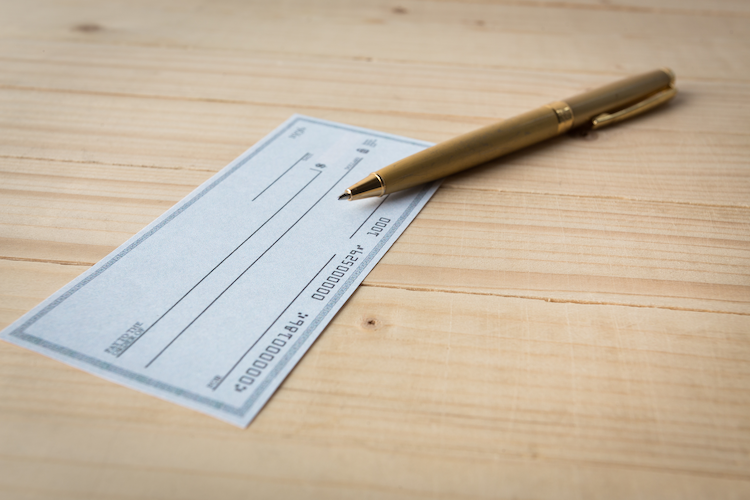Delaware Loses Bid to Keep Uncashed MoneyGram Checks

In Delaware v. Pennsylvania and Wisconsin, 598 U.S. ____ (2023), the U.S. Supreme Court held that uncashed MoneyGram checks are governed by the Disposition of Abandoned Money Orders and Traveler’s Check Act (FDA) and should be returned to the state where they were issued. It was Justice Ketanji Brown Jackson’s first opinion.
Facts of the Case
The case centers on which States have the power to escheat the proceeds of certain abandoned financial products that MoneyGram Payment Systems, Inc. (MoneyGram) possesses. Generally, a State may take custody of abandoned property located within its borders through a process commonly known as “escheatment.” However, the process becomes more complicated when abandoned property is intangible and lacks a physical location.
Delaware claims it has the power to escheat the proceeds of two financial products sold by banks on behalf of MoneyGram: Agent Checks and Teller’s Checks (collectively, Disputed Instruments). Operating much like money orders, both products are prepaid financial instruments used to transfer funds to a named payee. When these prepaid instruments are not presented for payment within a certain period of time, they are deemed abandoned.
MoneyGram applied the common-law escheatment practices outlined in Texas v. New Jersey, 379 U.S. 674 (1965) under which the proceeds of abandoned financial products should escheat to the State of the creditor’s last known address, or where such records are not kept, to the State in which the company holding the funds is incorporated. Because MoneyGram does not, as a matter of regular business practice, keep records of creditor addresses for the two products at issue in the case, it applied the secondary common-law rule and transmits the abandoned proceeds to its State of incorporation, i.e., Delaware.
Multiple States, including Pennsylvania and Wisconsin, argue that the common law does not apply because the abandoned proceeds of the Disputed Instruments are governed by the Disposition of Abandoned Money Orders and Traveler’s Checks Act. Accordingly, the States further maintain that the abandoned proceeds should escheat to the State where the products were purchased.
Supreme Court’s Decision
The Supreme Court unanimously agreed, holding that the Disputed Instruments are sufficiently “similar” to a money order to fall within the FDA. Because the Court found that the Disputed Instruments fall within the “other similar written instrument” category of the FDA, it did not need to decide whether they actually are money orders.
According to the Court, the Disputed Instruments share two relevant similarities with money orders. First, they are similar in function and operation. “[T]he FDA naturally applies to prepaid instruments, such as money orders, given that those instruments are of a type likely to implicate the FDA’s escheatment rules,” Justice Jackson wrote. “And Delaware does not dispute that, just like money orders, the Disputed Instruments are prepaid written financial instruments used to transmit money to intended payees.”
Second, due to the recordkeeping practices of the entity issuing and holding on to the prepaid funds, abandoned money orders and the Disputed Instruments both escheat inequitably under the Court’s common-law rules. “It is uncontested that the Disputed Instruments share the inadequate recordkeeping feature of money orders that the FDA identifies,” Justice Jackson explained. “Therefore, if the common law were to apply to the Disputed Instruments, then the abandoned proceeds would escheat inequitably solely to the State of incorporation, just like the money orders expressly referenced in the statute.” The Supreme Court went on to find that Delaware’s various arguments as to why the Disputed Instruments should not qualify as “other similar written instrument[s]” within the meaning of §2503 were unpersuasive.
Previous Articles
SCOTUS Decision in Bowe v. United States Is First of the 2026 Term
by DONALD SCARINCI on February 5, 2026
In Bowe v. United States, 607 U.S. ___ (2026), the U.S. Supreme Court held that Title 28 U.S.C. § ...
SCOTUS Rules State Can’t Immunize Parties from Federal Civil Liability
by DONALD SCARINCI on January 29, 2026
In John Doe v. Dynamic Physical Therapy, LLC, 607 U.S. ____ (2025) the U.S. Supreme Court held that...
Supreme Court to Address Racial Discrimination in Jury Selection
by DONALD SCARINCI onWhile the U.S. Supreme Court has concluded oral arguments for the year, it continues to add cases t...
The Amendments
-
Amendment1
- Establishment ClauseFree Exercise Clause
- Freedom of Speech
- Freedoms of Press
- Freedom of Assembly, and Petitition
-
Amendment2
- The Right to Bear Arms
-
Amendment4
- Unreasonable Searches and Seizures
-
Amendment5
- Due Process
- Eminent Domain
- Rights of Criminal Defendants
Preamble to the Bill of Rights
Congress of the United States begun and held at the City of New-York, on Wednesday the fourth of March, one thousand seven hundred and eighty nine.
THE Conventions of a number of the States, having at the time of their adopting the Constitution, expressed a desire, in order to prevent misconstruction or abuse of its powers, that further declaratory and restrictive clauses should be added: And as extending the ground of public confidence in the Government, will best ensure the beneficent ends of its institution.





